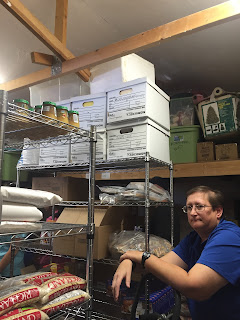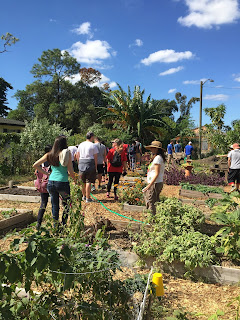The Pine Manor Community Garden and Center aids impoverished families in Fort Myers, located in Southwest Florida. Pine Manor provides local families with many vital resources thanks to its financial backing from local Goodwill stores. Many of the people in this area are primarily Spanish speaking only, making it challenging for them to obtain employment. Also being a poor area many families do not have computers or steady internet access. Pine Manor has computers available for families to use for job applications, food stamp applications, unemployment, and other well fare programs needed to survive. The employees also offer assistance if people need help filling out any applications; there is a bilingual (English and Spanish) employee to assist people who can only speak Spanish. Pine Manor also offers a GED course, and it only costs 20 dollars to take. The 20 dollars serves as initiative for people to complete the course, and if they do finish the course the money is returned to them, so the GED course is actually free as long as you complete it. Many poor communities do not have a center that offers all these much needed resources, and that is only some!
Pine Manor also has a Food Bank that provides the impoverished families in the neighborhood with free food (Figures A, B, and C)! This is so important when so many people are struggling to feed their families in low income communities. Pine Manor offers what food they can to their patrons when they can because programs like these are frequently running out of funding and/ or resources. Pine Manor is also equipped with a full kitchen located in its own building (Figures D, E, F and G). The kitchen was built from 2012 through 2014, and Pine Manor had to apply for a grant to begin culinary classes. The culinary program has been highly successful and was even ran by a chef from FGCU up until recently.
Figure A: Food Bank
Figure B: Food Bank and Mrs. Sheri (director)
Figure C: Food Bank
Figure D: Kitchen Supplies
Figure E: Kitchen Sink
Figure F: Kitchen Stove
Figure G: Kitchen Fridge
Pine Manor also has an after school program for elementary aged children from 2:30 pm when the kids get out of school till 5 pm when parents begin to get out of work or big siblings out of school. They also offer a teen program that runs from 5:30 pm to 7:30 pm. The after school and teen program aim to keep local poor kids out of trouble and off the streets, while simultaneously providing them with positive role models. The teen program is held four days a week: Monday, Thursday, Friday, and Sunday. Thursday the teen program director Greg (Figure H) teaches a moral lesson or a valued skill, and on Sunday he takes the kids to church, and the other days are free days for the kids to hang out and have positive social interactions (Figure I). The after school program also allows the younger kids to play together in a safe and accepting environment (Figure J). In previous years, before Mrs. Sheri became the main director of all programs at Pine Manor about five or six years ago, there were around thirty reported crimes a month compared to the eight to ten reported now. This is due to the police presence in the Pine Manor neighborhood at all times because of the Community Center.
Figure H: Greg the Teen Program Director
Figure I: Teen Program; Positive Social Interaction
Figure J: Playground for After School Program
Pine Manor is also home to a Food Forest and a thriving garden! They are also in the process of planting a larger Food Forest across the street due to the success of the first one planted only three years ago! Pine Manor is located in a Food Desert, meaning there is no access to fresh organic produce. There is also little in the way of reliable public transportation options, and some Pine Manor families do not own vehicles making it difficult for them to make trips to the grocery store. The Food Forest and Garden supply community members with healthy food within walking distance. There is a separate area dedicated to small "box gardens" that locals can rent out (Figures K, L and M). There are 25 private box gardens available to locals. If renting a box garden the renter must only care for their own plants and pay a small fee for using the space, then when the time comes they will have their own plants and food available!
Figure K: Private Box Gardens
Figure L: Private Box Gardens
Figure M: FGCU Class Among the Box Gardens
In order for the gardens to be fruitful in the Florida heat they must be Perennial. Perennial gardens require little maintenance (watering) and have long life spans, as opposed to annual gardens which require year around maintenance and can be very hard to manage. The gardens, or at least the main garden, must also contain flowering plants to attract pollinators like bees (Figure N). The permaculture must also be a poly-culture, or contain many diverse plant species, over a mono-culture that contains only one plant species. This is important because if a single plant species gets infected it will spread quickly among that species, so if there are many plant species it can stop the spread of disease. Pine Manor relies on volunteers to keep their Food Forest and Garden thriving and many volunteers come from Florida Gulf Coast University (Figure O). Pine Manor also works with students for school projects and with local scouts for their projects in order to earn badges (Figures P and Q).
Figure N: Marigolds- pollinators; prevent nematodes in soil
Figure O: FGCU Students Working in Pine Manor Garden
Figure P: Student Project: Recycled Tire Gardens
Figure Q: Boy Scout Project (Benches)
Some Plants in the Pine Manor Garden:
Malabar Spinach
Malabar Spinach
Okra
Eggplant
Not Photoed- Mint (keeps pests away), squash, winged bean (roots and leaves edible), plus others I was unable to catch the names of or who' names have escaped me.
Some Plants in the Pine Manor Food Forest:
Example of Biodiversity in Food Forest
Jamaican Red (small) Bananas- about 40-60 bananas per clutch; planted in half circle with compost in the center for nutrients
Papaya's- belongs to both the fruit and vegetable family
Lemon Grass
Moringa
Fun Facts:
Miranda Seeds filter water and are extremely healthy.
Legumes are incorporated into gardens and food forests for nitrogen.



























No comments:
Post a Comment